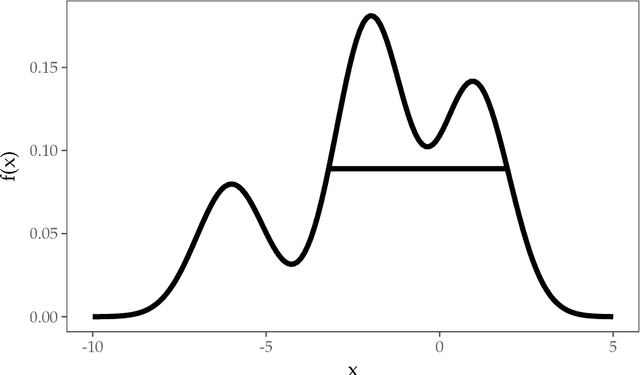Raphael Gottardo
Selective Clustering Annotated using Modes of Projections
Jul 26, 2018



Abstract:Selective clustering annotated using modes of projections (SCAMP) is a new clustering algorithm for data in $\mathbb{R}^p$. SCAMP is motivated from the point of view of non-parametric mixture modeling. Rather than maximizing a classification likelihood to determine cluster assignments, SCAMP casts clustering as a search and selection problem. One consequence of this problem formulation is that the number of clusters is $\textbf{not}$ a SCAMP tuning parameter. The search phase of SCAMP consists of finding sub-collections of the data matrix, called candidate clusters, that obey shape constraints along each coordinate projection. An extension of the dip test of Hartigan and Hartigan (1985) is developed to assist the search. Selection occurs by scoring each candidate cluster with a preference function that quantifies prior belief about the mixture composition. Clustering proceeds by selecting candidates to maximize their total preference score. SCAMP concludes by annotating each selected cluster with labels that describe how cluster-level statistics compare to certain dataset-level quantities. SCAMP can be run multiple times on a single data matrix. Comparison of annotations obtained across iterations provides a measure of clustering uncertainty. Simulation studies and applications to real data are considered. A C++ implementation with R interface is $\href{https://github.com/RGLab/scamp}{available\ online}$.
Sequential Dirichlet Process Mixtures of Multivariate Skew t-distributions for Model-based Clustering of Flow Cytometry Data
Sep 11, 2017



Abstract:Flow cytometry is a high-throughput technology used to quantify multiple surface and intracellular markers at the level of a single cell. This enables to identify cell sub-types, and to determine their relative proportions. Improvements of this technology allow to describe millions of individual cells from a blood sample using multiple markers. This results in high-dimensional datasets, whose manual analysis is highly time-consuming and poorly reproducible. While several methods have been developed to perform automatic recognition of cell populations, most of them treat and analyze each sample independently. However, in practice, individual samples are rarely independent (e.g. longitudinal studies). Here, we propose to use a Bayesian nonparametric approach with Dirichlet process mixture (DPM) of multivariate skew $t$-distributions to perform model based clustering of flow-cytometry data. DPM models directly estimate the number of cell populations from the data, avoiding model selection issues, and skew $t$-distributions provides robustness to outliers and non-elliptical shape of cell populations. To accommodate repeated measurements, we propose a sequential strategy relying on a parametric approximation of the posterior. We illustrate the good performance of our method on simulated data, on an experimental benchmark dataset, and on new longitudinal data from the DALIA-1 trial which evaluates a therapeutic vaccine against HIV. On the benchmark dataset, the sequential strategy outperforms all other methods evaluated, and similarly, leads to improved performance on the DALIA-1 data. We have made the method available for the community in the R package NPflow.
 Add to Chrome
Add to Chrome Add to Firefox
Add to Firefox Add to Edge
Add to Edge